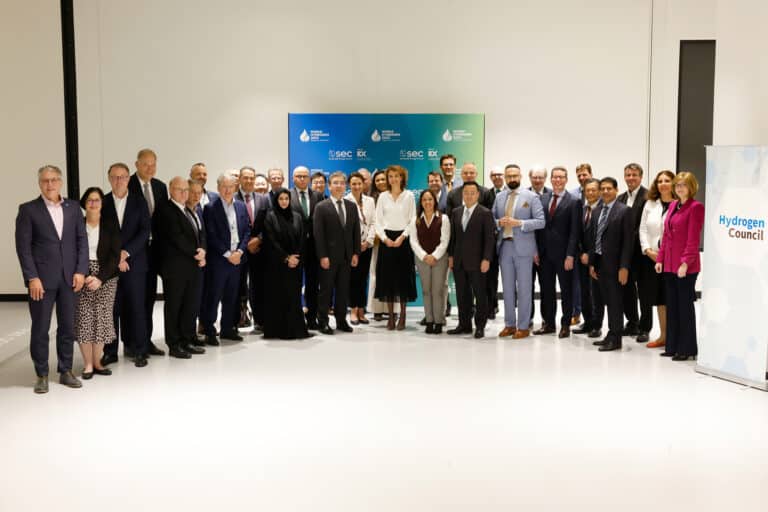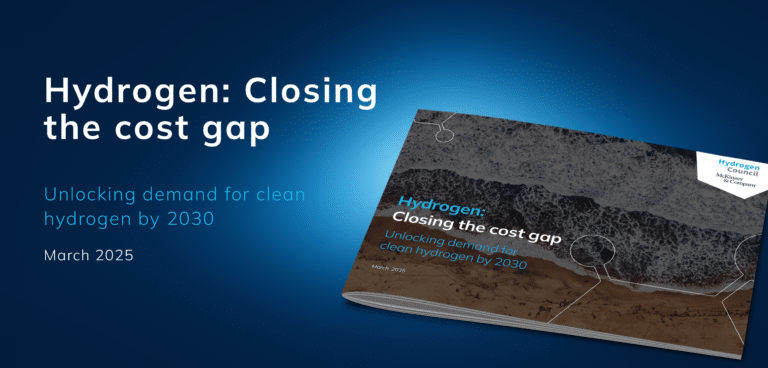Toyota was one of 13 founding members of the Hydrogen Council when the global CEO-led initiative was created in 2017. What does it mean to Toyota to be a founding member of the Council?
When the Hydrogen Council was founded in 2017, we were a small group of 13 companies and executives that strongly believed in the future of hydrogen and the need of cross-sectorial collaboration. It was winter in Switzerland, and despite that it was freezing cold outside when we took the group picture, and despite of meeting in a very small room, everyone was in very good mood and we felt that we created an important organisation.
Why did Toyota want to be a part of the Hydrogen Council?
Hydrogen has the potential to support the transition to a low carbon society across multiple industries. In order to realize a hydrogen-based society, it is necessary for the supply side, demand side, governments, and investors to implement their respective measures and strengthen cooperation. We expected the Hydrogen Council to take initiatives in moderating stakeholder cooperation and collaboration.
In the six years since Hydrogen Council launched, the organization has grown significantly. As one of 13 founding members, what are some of the biggest milestones achieved so far?
The Council brings together some of the world’s leading companies, from upstream to downstream in the hydrogen supply chain, with a clear vision of a
hydrogen-based society. The Council has grown significantly, having boosted global collaboration between governments, industries, investors, and international organisations over the past few years. Each of these stakeholders has its own role to play to unlock the potential of hydrogen. Public-private collaboration is the only way to achieve that goal and the Council will take initiatives to further foster this cooperation.
Through the Hydrogen Council, Toyota is collaborating with players across key industrial sectors to help set up the right conditions and infrastructures to develop hydrogen-powered solutions, and driven initiatives to raise awareness of the multiple benefits of their more widespread adoption.
Can you tell us more about the important work of the Council? Perhaps you have a couple of examples to share?
We have always tried to play a leading role in environmental and technological advances in the automotive industry, including through the introduction of fuel cell vehicles. We know that in addition to transportation, hydrogen has the potential to support our transition to a low carbon society across multiple industries and the entire value chain. The Hydrogen Council provides a platform to bring together leaders to identify barriers, drive collaboration and find solutions for a hydrogen-based society.
With regards to hydrogen, what is Toyota working on right now?
We are broadening the number of fuel cell applications together with other partners. Starting from the Mirai, we have developed and introduced hydrogen buses, trucks, back-up generators and we are working on maritime, railway and aviation applications. We discovered that the interest and potential of our fuel cell technology for various applications has almost no limits.
We are also working on hydrogen combustion engines as another route into the hydrogen economy.
About The Hydrogen Council
The Hydrogen Council is a global CEO-led initiative that brings together leading companies with a united vision and long-term ambition for hydrogen to foster the clean energy transition. The Council believes that hydrogen has a key role to play in reaching our global decarbonization goals by helping to diversify energy sources worldwide, foster business and technological innovation as drivers for long-term economic growth, and decarbonize hard-to-abate sectors.
Using its global reach to promote collaboration between governments, industry and investors, the Council provides guidance on accelerating the deployment of hydrogen solutions around the world. It also acts as a business marketplace, bringing together a diverse group of 140+ companies based in 20+ countries across the entire hydrogen value chain, including large multinationals, innovative SMEs, and investors.
The Hydrogen Council also serves as a resource for safety standards and an interlocutor for the investment community, while identifying opportunities for regulatory advocacy in key geographies.
To find out more visit www.hydrogencouncil.com and follow us on Twitter @HydrogenCouncil and LinkedIn.
Joanna Sampson, Communications Manager, Hydrogen Council
joanna.sampson@hydrogencouncouncil.com



